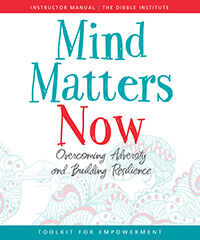
Scholarships are now available!
This workshop has impacted my life in a major way!!! I acquired tools to apply at my organization, for my staff to use, and most of all tools that I can utilize immediately to help me in the area of self-care. This was a very valuable learning experience. I look forward to using the self-soothing techniques and to identify support systems. I will keep you posted.
I originally purchased Mind Matters as I knew it could make a difference in the lives of the youth we serve. I had no idea it would make such a difference in my life as well as my staff.
Thank you for this series! It came at a very important time in my life. After caring for my father this last year while he went through chemo for pancreatic cancer, we got a terminal prognosis on March 4th of this year. He passed away on May 7th. I couldn’t be more grateful to have Mind Matters come into my life during this time of grief. Thank you.

In 2017, we released the Mind Matters curriculum to teach people skills and practices that cultivate healing and build resilience through on-demand learning.
Today, in response to the stress caused by the COVID-19 pandemic, The Dibble Institute® has created Mind Matters Now, an on-demand, virtual learning experience with that same goal.
Thanks to a generous grant, Mind Matters Now is available at a low cost to front line workers, teachers, medical professionals, and others to tend to themselves and care for those around them.
Mind Matters Now is an on-demand learning experience that teaches the content of our Mind Matters curriculum. These self-directed, online lessons are available in the full 12-lesson series or in three shorter 4-lesson series.
Continuing Education Credits are available.
Sample: Self Soothing - Focused Breathing from Lesson 1
Audio Message from Author Carolyn Rich Curtis, PhD

The effects of childhood trauma and toxic stress are not easy to overcome. Formal training is often required for people to learn to notice and interrupt destructive thought patterns and harmful behaviors. Mind Matters teaches people skills and practices that cultivate healing and clear away distractions to learning and healthy relationships.
Mind Matters’ practical, hands-on lessons explore the effects of adversity and toxic stress along with the healing process. Each of the 12 lessons, based on ACEs science, includes activities that build resilience and increase hope. The Appendix offers guidance to adapt the lessons into twenty-one 15 to 20 minute sessions for use in one-on-one settings, making the curriculum suitable for case workers, home visitors, mentors, and others working with individuals and families.
The lessons address the following topics:
- Self-Soothing and Regulating Emotions: Cultivate a mindfulness practice
- Managing Stress Effectively: Learn to reduce intrusive thoughts
- Developing Empathy: Improve interpersonal communications
- Creating a Code of Honor: Develop a life of intention
- Building and Using a Support System: Learn how to ask for help
The skills taught in Mind Matters are designed to be practiced over a lifetime. The curriculum is not meant to be therapy or to replace psychotherapy. Rather, it is intended to be facilitated by paraprofessionals to inspire, uplift, and set people on the journey of healing as they cultivate deeper resilience.
Mind Matters can also be used to increase Social and Emotional Learning (SEL), improve self-regulation, prevent violence, and build a culture of wellness.
Series One – Learning to Pause
- Lesson 1: Self-Soothing
- Lesson 2: Discover Emotions
- Lesson 3: Emotion and Thought / Internal Journal
- Lesson 4: Building Empathy
- Lesson 5: Help from My Friends / Wheel of Awareness
- Lesson 6: The Hijacked Brain
- Lesson 7: Trauma Containment and Rhythm
- Lesson 8: Tapping / Efficient Sleep
- Lesson 9: Let’s Get Moving
- Lesson 10: Life of Intention
- Lesson 11: Code of Honor / Asking for Help
- Lesson 12: The Ongoing Journey
Contains all content listed above. On-demand learning.
Mind Matters: Overcoming Adversity and Building Resilience supports the healing process in young people who have experienced Adverse Childhood Experiences (ACEs) and other traumas. This research-based curriculum offers strategies to help teens and adults understand the effects of adversity and toxic stress, and teaches them skills to soothe and calm their mental and physical stress responses.
Mind Matters is an effective precursor or accompaniment to programs that build relationship skills and equip vulnerable youth for healthy futures because it helps clear away barriers to focus and learning.Young people who have experienced trauma often have difficulty regulating their emotional and verbal responses to common life situations and relationships. In 12 lessons, the course builds students’ resiliency by healing their brains, their health, and their lives.
Each lesson in the curriculum includes activities that build resilience and increase hope. These practical, hands-on activities and techniques can be implemented immediately, giving students tools to improve their lives starting with the very first lesson. The program also centers on practice. Students learn that “practice makes progress, not perfection,” and are given the space to progress at their own pace.
Mind Matters is flexibly designed to meet the needs of your program and your participants through on-demand learning. The curriculum can be facilitated by para-professionals with simple practices that can be used in a variety of settings. Individual lessons and their accompanying activities are easily integrated into your existing programs as shorter time blocks or one-hour lessons.
Mind Matters focuses on six major goals:
- Utilize Self-Soothing Skills
- Develop an Observing Self
- Strengthen Relationships
- Compassion for the Hijacked Brain
- Practice Self-Care
- Live Intentionally
Self-regulation is the foundation of the program. As participants learn to pair existing negative thoughts with self-soothing skills, they begin to take charge of their lives and improve their states of mind. Through Mind Matters, students learn to address physical, relational, mental, and spiritual needs that are essential to increase their quality of life. They see that they are already the hero in their own life’s story.
The skills taught in Mind Matters are designed to be practiced over a lifetime. The curriculum is not meant to be group therapy or to replace psychotherapy. Rather, it is designed to inspire, uplift, and set young people on the journey of healing as they cultivate deeper resilience.
 Carolyn Rich Curtis, Ph.D. is a Licensed Marriage and Family Therapist and founder of the Relationship Skills Center. She obtained her doctorate at the Professional School of Psychology, Masters from CSU, Sacramento and Bachelor’s Degree from UC, Davis. The Relationship Skills Center has been recognized as one of the leading organizations in the nation in building healthy relationships, and was awarded two Healthy Marriage federal grants.
Carolyn Rich Curtis, Ph.D. is a Licensed Marriage and Family Therapist and founder of the Relationship Skills Center. She obtained her doctorate at the Professional School of Psychology, Masters from CSU, Sacramento and Bachelor’s Degree from UC, Davis. The Relationship Skills Center has been recognized as one of the leading organizations in the nation in building healthy relationships, and was awarded two Healthy Marriage federal grants.
In recognition of her innovations, the Administration for Children and Families wrote three monographs about the Skill Center. Dr. Curtis spoke at the White House regarding the success of their program. In her clinical practice, she specialized in working with couples, alcohol abuse and trauma. She was an adjunct faculty member in the Psychology Department of California State University, Sacramento and American River College teaching Child Development, Human Sexuality, Stress Management, Applied Psychological Principles and Introduction to Psychology.
Dr. Curtis is a trainer of facilitators for Mastering the Mysteries of Love, Bringing Baby Home, Relationship Enhancement, and PAIRS. She is a Certified Imago Therapist, and Certified Clinical Trauma Professional. She presented papers at Smart Marriage Conference, The Governor’s Conference on Child Abuse, the California Association of Marriage and Family Therapists, University of California Conference on Child Abuse and Neglect, International Transactional Analysis Association Conference, Fathers and Families Coalition of America, Office of Family Assistance Grantee Conference.
 Charles F Stolzenbach, L.M.F.T. is a Licensed Marriage & Family Therapist with over 40 years of clinical experience. Currently, he a Senior Mental Health Counselor with Sacramento County with the Department of Health and Human Services. For the past 18 years he has provided counseling services for the Temporary Assistance for Needy Families.
Charles F Stolzenbach, L.M.F.T. is a Licensed Marriage & Family Therapist with over 40 years of clinical experience. Currently, he a Senior Mental Health Counselor with Sacramento County with the Department of Health and Human Services. For the past 18 years he has provided counseling services for the Temporary Assistance for Needy Families.
He has degrees from Bluffton University, Garrett School of Theology at Northwestern University, and the University of California Irvine. Previous to this work, Stolzenbach was a Methodist Pastor for five churches and served as a Navy Chaplain during the Vietnam War.
During 30 years of experience in private practice, he specialized in couples, families, and individuals, alcohol abuse, and the effects of trauma on brain and bodily health. He was Director of the El Dorado Council of Alcoholism and founder of the Sierra Behavioral Health, Inc. He has clinical membership in the California Association of Marriage and Family Therapists, Certified Imago Therapist, and a member of the International Association of Trauma Professionals. He has certifications as Employee Assistance Professional, Imago Therapy, Group Psychotherapist, and Supervisor of Marriage and Family Therapists, and is an Instructor in Mastering the Mysteries of Love, PAIRS, Gottman Bringing Baby Home, and has training in Critical Stress Incidence Debriefing and EMDR Level II.
He now works with men and women to remove behavioral health barriers threatening their ability to successfully transition to the workforce and thrive as individuals. His work in part involves the use of behavioral health skills to reduce emotional distress and clear the way for productivity and personal fulfillment. His treatment perspective is comprehensive and focused addressing the factors impacting their ability to thrive in workplace environments, personal relations, and areas of personal health, well-being, and happiness.
The evidence-based materials in Mind Matters build on research in neuroscience and on the work of leaders in trauma care. The curriculum focuses on five major topics:
- Self-Soothing
- Developing and Observing Self
- Relationship Skills
- Compassion for the Hijacked Brain
- Self Care
- Intentionality
Dr. Becky Antle, a Professor of Social Work and esteemed University Scholar at the University of Louisville with an established background in program evaluation, competed in and won The Dibble Institute’s national competition to evaluate the Mind Matters: Overcoming Adversity and Building Resilience program. As part of the agreement, Dr. Antle and her colleagues are conducting a randomized control trial to examine the impact of Mind Matters on a host of outcomes related to youths’ emotion regulation, anxiety, interpersonal skills, and resilience.
Preliminary analysis shows statistically significant improvement in knowledge and skills from pre- to post-intervention. Participants developed better knowledge and skills for coping with trauma and adversity. Partners report youth using the skills in daily life in residential treatment.
Continuing Education Credits are available for purchase. Follow the link below to purchase the assessment and certificate for the course from R. Cassidy Seminars.


